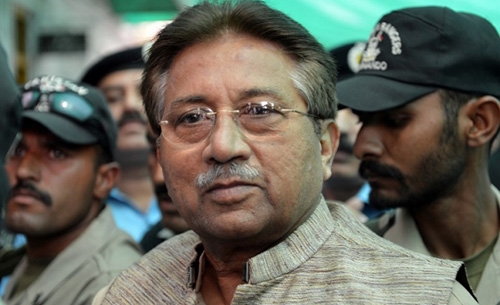Pakistan court acquits Musharraf of rebel leader's killing
A Pakistani court Monday acquitted former military ruler Pervez Musharraf over the 2006 killing of a Baloch rebel leader, one of three legal cases he faced after returning from exile, lawyers said.
The decision Monday was the first significant ruling in the cases, which include the murder of former leader Benazir Bhutto in 2007 and treason, since Musharraf was indicted in 2015 for the killing of nationalist leader Nawab Akbar Bugti.
A spokesman for Musharraf told AFP he was happy with the ruling, which "will restore the people's confidence in the judiciary".
The former ruler also hopes to be acquitted in the other cases, which the spokesman said Musharraf described as "false and politically motivated".
Bugti was killed in a military operation in 2006, sparking deadly nationwide protests and inflaming a separatist insurgency in resource-rich but impoverished Balochistan province.
"The court has dismissed all the charges against former ruler Pervez Musharraf and all those named in the case," Aftab Sherpao, a former interior minister also named in the case, told media in the southwestern city of Quetta.
The anti-terror court's ruling was confirmed by lawyers on both sides.
"It's an injustice and a joke," Suhail Rajput, lawyer for the Bugti family, told media and vowed to appeal.
Musharraf seized power in a bloodless coup in 1999. Facing impeachment following elections in 2008, he resigned as president and went into self-imposed exile in Dubai.
He returned to Pakistan in 2013 on an ill-fated mission to run in the general election, but was barred from taking part and has since faced a barrage of legal cases.
They include treason for imposing emergency rule in 2007, and the assassination of opposition leader Benazir Bhutto in a gun and suicide attack that same year.
Musharraf has been under house arrest in Karachi while the cases have ground through Pakistan's notoriously slow legal system, moving from adjournment to adjournment with little clear progress apart from the granting of bail.
Analysts have previously said they believe the government of Prime Minister Nawaz Sharif lacks the will to offend Pakistan's powerful military by pushing for Musharraf's prosecution.
Sharif was also prime minister in 1999, when he was deposed by Musharraf.
Pakistani analyst Imtiaz Alam said the Bugti investigation and prosecution had been "poor".
"The administration was under pressure not to find any hard evidence against the powerful players," he told AFP, without specifying who was applying the pressure.
Government efforts to persuade militants to lay down their arms in Balochistan has seen the insurgency begin to slow in recent months, and security analyst Talat Masood said there would not be significant fall-out from the decision.
"It's a win-win situation both for the government and Musharraf," he told AFP.
Related Posts

